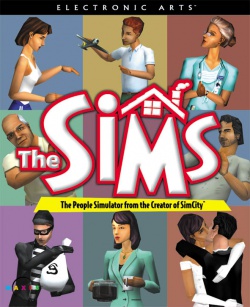The Sims Makes Gamespot's Greatest Games List
"Like all truly great games, it is the timeless and continually entertaining gameplay that makes The Sims so worthwhile... but nothing quite like The Sims had ever been released, nor perhaps, ever will be."
The Game That Launched a Thousand Expansions
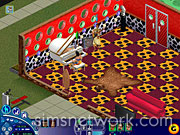
The Sims: Livin' Large introduced new vital floor patterns.
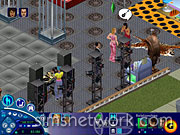
The Sims: House Party made being social even easier, with cages for people to dance in.

The Sims: Hot Date is...uh...self-explanatory.
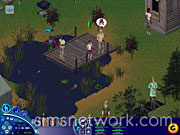
The Sims: Vacation: Just because you're on vacation doesn't mean you get a break from managing needs.
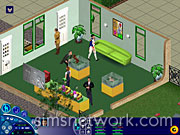
The Sims: Unleashed gives you a very suitable alternative to having a baby, just like in real life.
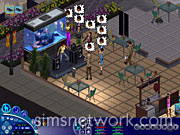
The Sims: Superstar could make you virtually famous. It's almost the same thing.

The Sims: Makin' Magic brought some options that you were probably looking for in all the other expansion packs.
Balancing Domestic Coefficients
by Carrie Gouskos
The Sims wasn't just any old strategy game--it took a more personal look at "a day in the life" and set new boundaries in terms of sales, in terms of reach, in terms of personality, in terms of everything. Released at the beginning of 2000, out of the mind of legendary designer Will Wright, The Sims was an easy game to look at, to pick up and play, and to get addicted to, and it's responsible not only for fostering a rabid addiction, but also for bringing the genre to a much wider audience than such games had typically received in the past.
In The Sims, you took charge of Sims (simulated people) by selecting one of the default families, or designing one yourself. With brand-new families, you could create up to four characters in one house; you could slightly alter their personalities and appearances by choosing among a few preset features and body types, and you could allocate points to the attributes that govern your Sims' neatness, playfulness, and activity (among other traits). After that, you used a set budget to build or purchase a house, furnish it, and begin your life. Of course, moving into a new home wasn't easy, and the things that you could afford off the bat weren't always the nicest or most luxurious. Each purchasing sacrifice, whether it was to get the single bed instead of the gorgeous fluffy double, or to get the small TV instead of the widescreen plasma, would be reflected in the way those activities affected your mood meter. You could have a good time shooting hoops with a couple of your friends, but it was nothing compared to playing a few games on the $4,000 Aristoscratch pool table.
 In this way, the game continually challenged you to become more successful, to stay abreast of the things that would keep your Sim happy, and to make the money necessary to afford the finer things in life. The constant struggle to keep your good mood, your job, and your friends was made more difficult by a life of greater success, but it was always perfectly blended together in a way that made even the most mundane activities entertaining. Though not always accurate--it always took upwards of 20 minutes to go to the bathroom, and you could get a promotion almost as soon as you met the minimum personality requirements for it--the game was extremely well balanced. You had just enough time in any given day (and the clock was always ticking) to take care of your needs, such as hygiene, nutrition, comfort, and fun, and build up just a few new attributes, like cooking, creativity, and charisma, before passing out on your couch in front of the blaring TV and waking up every few minutes due to the noise.
In this way, the game continually challenged you to become more successful, to stay abreast of the things that would keep your Sim happy, and to make the money necessary to afford the finer things in life. The constant struggle to keep your good mood, your job, and your friends was made more difficult by a life of greater success, but it was always perfectly blended together in a way that made even the most mundane activities entertaining. Though not always accurate--it always took upwards of 20 minutes to go to the bathroom, and you could get a promotion almost as soon as you met the minimum personality requirements for it--the game was extremely well balanced. You had just enough time in any given day (and the clock was always ticking) to take care of your needs, such as hygiene, nutrition, comfort, and fun, and build up just a few new attributes, like cooking, creativity, and charisma, before passing out on your couch in front of the blaring TV and waking up every few minutes due to the noise.
But it wasn't simply the mechanics that make The Sims so great; it's the humor and personality behind it. Though the characters don't speak, per se--they rattle off gibberish--their intention was clear in their inflection, gestures, and thought bubbles. And while you were able to intervene with your characters, determining how they behave and interact to a certain extent, it was almost more entertaining to leave this up to the game, seeing how the combination of mood and personality would guide their behaviors with the other Sims in the neighborhood. No matter which you chose, you were sure to end up with quite a few stories to tell of your Sims' endeavors. Like the time you invited too many people over and the toilet got clogged, so one of your Sims ended up going to the bathroom on the floor before the repairman arrived. Or that every time one of your characters--who had yet to level up his cooking ability--touched the stove, he caught on fire. Maybe it's how your wife caught you kissing Bella Goth, the sexy vixen in the red dress down the street who had a questionable relationship with a man named Mortimer. Even though the game was a caricature of real life, it was almost startlingly lifelike, and it took just one passionate deep kiss followed by the words "Would you like to have a baby?" to see it.
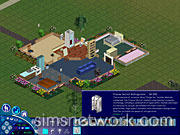 The Sims was open-ended enough that you could live out your Sims' lives any way you saw fit. If you wanted to follow specific goals, advancing up the career ladder, maximizing all your skill points, or building up the family fortune, you could do all of it very specifically and deliberately. Of course, you could alternatively create characters with drastically different personalities and leave them to their own devices, letting the game take control as long as the "free will" box was checked. Despite the game's limited amount of items, you could assemble characters, build houses, and create lives virtually any way you wanted. And the limitation was soon nullified by the game's many expansions. Though The Sims was certainly good enough on its own merits that didn't stop it from becoming the game with the most expansion packs to date, with seven. With MMORPG-esque qualities, but not nearly as many choices, The Sims saw new life and new strangeness with each addition to its arsenal.
The Sims was open-ended enough that you could live out your Sims' lives any way you saw fit. If you wanted to follow specific goals, advancing up the career ladder, maximizing all your skill points, or building up the family fortune, you could do all of it very specifically and deliberately. Of course, you could alternatively create characters with drastically different personalities and leave them to their own devices, letting the game take control as long as the "free will" box was checked. Despite the game's limited amount of items, you could assemble characters, build houses, and create lives virtually any way you wanted. And the limitation was soon nullified by the game's many expansions. Though The Sims was certainly good enough on its own merits that didn't stop it from becoming the game with the most expansion packs to date, with seven. With MMORPG-esque qualities, but not nearly as many choices, The Sims saw new life and new strangeness with each addition to its arsenal.
While The Sims was certainly revolutionary, it wasn't simply the revolution that makes it one of the greatest games of all time. Like all truly great games, it is the timeless and continually entertaining gameplay that makes The Sims so worthwhile. And while in the years since its release there have been many more versions to choose from, there's something quite heartwarming and familiar about the original game and its very specific choices, the sublime stainless steel refrigerator, the Henry Moore-esque statue, and that handy dandy little burglar alarm. Not that many games like this had even been made--one of the few games you could compare it to was 1985's Little Computer People...but nothing quite like The Sims had ever been released, nor perhaps, ever will be.














